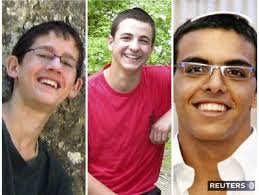
(The authors are members of the board of the Religious Zionists of America.)
The world's praise for Palestinian Authority chairman Mahmoud Abbas's opposition to the kidnapping of the Israeli teenagers has been as loud and frequent as the world's condemnation of the kidnapping itself.
President Obama, in his statement following the discovery of the victims' bodies, went out of his way to claim, not once, but twice, that Palestinian leaders were just as opposed to the kidnapping as Israel's leaders.
Why this ludicrous insistence on portraying Abbas and the PA as Israel's friend in the fight against terrorism?
Perhaps because it is a myth. And the way for a myth to gain acceptance is to repeat it so often that people get used to it and soon believe it to be true.
As news of the June 12 kidnapping spread, the Palestinian Authority responded not with condemnations of the deed but with praise. The PA's official daily newspaper, Al-Hayat Al-Jadida, published an editorial cartoon on June 15 that celebrated the kidnapping: it used the three hands in the logo of the World Cup soccer tournament to show three hands each holding the "trophy" of a kidnapped boy.
That same day, the official Facebook page of Fatah -- the movement chaired by Abbas -- depicted a large hand holding up the traditional "victory" sign--except with three fingers instead of the usual two. The caption: "For your interpretation :)." That was a smiley-face symbol at the end. A photo on the Fatah web site showed a hand holding up three fingers, with the words "Three Shalits" written on them -- a reference to the Israeli soldier Gilad Shalit whom Hamas kidnapped in 2006.
Meanwhile, the official Facebook page of the Abbas's Palestinian National Security Forces displayed a cartoon showing three Israeli soldiers with gigantic noses slaughtering innocent Palestinians as they search for the kidnappers.
On June 16 -- four days after the kidnappings -- Abbas finally issued his first condemnation of the attack. But to call it a "condemnation" is overly generous. It was a statement by "the Palestinian President's Office," without mentioning Abbas by name. Instead of explicitly condemning the kidnapping, the statement said that "the Office condemned the chain of events that took place last week, from the kidnapping of the three Israeli youths to the series of consecutive Israeli violations -- both concerning the prisoners' hunger strike and the break-ins into the Palestinian homes, the attacks of the settlers and the occupation army, which lead to the death of a young Palestinian as a Martyr, and the persecution of numerous innocent people."
The statement was so weak that even American friends of the Palestinians refrained from claiming it was a "condemnation." Behind the scenes, they undoubtedly urged Abbas to come up with something better. And so, on June 18 --fully six days after the kidnappings-- Abbas finally issued a statement. That's the statement that resulted in all the gushing praise from around the world.
Let's took a careful look at what he said, and where he said it.
"Where" is important. If Abbas sincerely wanted to send a message to the Palestinian public that kidnapping is wrong and that they should help find the kidnappers, he could have delivered an address from PA headquarters in Ramallah and broadcast it live on official PA television and radio in prime time. Instead, he made his statement at a meeting of Arab foreign ministers in Saudi Arabia.
Incredibly, Abbas did not even use the word "condemn." He said the kidnapped boys were "human beings," as if that acknowledgement were some major concession. Most of his so-called condemnation consisted of accusing Israel of having "found a suitable opportunity to use violence against us, to destroy everything and wreak havoc and destruction throughout the land, especially in the Hebron area."
Meanwhile, back home, the official PA media did not let up in its incitement. An editorial in the PA daily Al-Hayat Al-Jadida on June 18 speculated that the kidnapping was a hoax -- "an Israeli political trap meant to justify its punitive measures against the citizens?" Regular columnist Muwaffazq Matar wrote in the same edition that the kidnapping might be "a deliberate act on the part of Israel."
In the next day's edition, Bakr Abu Bakr called the kidnapping "a golden opportunity for the Israeli Khazar prime minister." That was a reference to the old antisemitic theory that Israelis are not real Jews, but are descendants of a medieval central Asian tribe.
And so it went, day after day. PA Foreign Minister Riyad Al-Maliki called the kidnapping "a childish game on Israel's part." (June 22) An op-ed in Al-Hayat Al-Jadiida called the victims "three settlers who were on land that did not belong to them." (June 23) PA Television broadcast a declaration by the mother of one of the kidnap suspects that "if it is a true accusation, I will be proud of him until Judgement Day." (June 29)
When the victims' bodies were discovered on June 30, the official PA News Agency, WAFA, issued two reports: one in English, which called the boys "three allegedly abducted settlers" but did not condemn the murder; and one in Arabic, which said nothing about the victims and instead condemned Israel for its tactics in searching for them. Meanwhile, Fatah's Facebook page posted photos of crying Israelis (but no condemnation) and called the teenage civilian victims "soldiers." (All translations courtesy of Palestinian Media Watch.)
Those who want to protect Mahmoud Abbas's image, in order to keep promoting the goal of Palestinian statehood, will no doubt continue to claim that he condemned and opposed the kidnapping. But his actual words, and the words of his official media, say otherwise.
[The authors are members of the board of the Religious Zionists of America.]






